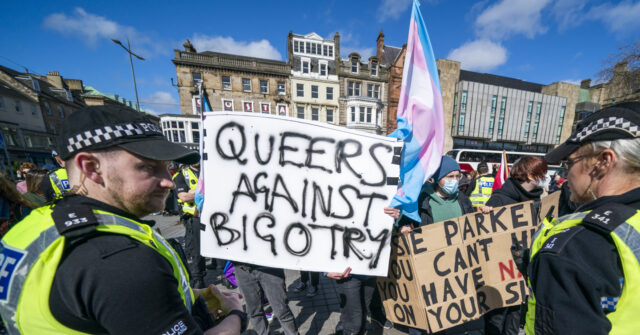
Police Scotland has been overwhelmed by a flood of reports under the recently implemented draconian speech restrictions, with approximately 8,000 reports in the first week, alone, surpassing the annual total for hate crimes in general of any other year.
Law enforcement in Scotland has claimed that it “can’t cope” with the staggering number of reports flooding into police stations after the controversial Hate Crime and Public Order (Scotland) Act 2021 came into force last Monday, criminalising the opaquely-worded “stirring up hatred” towards protected groups, such as the so-called LGBTQ2AIS community, among others.
According to initial estimates, Police Scotland received around 8,000 complaints under the law in the first seven days of its implementation, which according to analysis by The Telegraph, would surpass the total number of crimes reported annually (416,000) if the trends continue.
The broadsheet also noted that the number of supposed hate speech violations reported to police in the first week surpassed the total number of hate crimes as a whole recorded in any full year in Scotland.
The chairman of the Scottish Police Federation David Threadgold warned that the man-power hours required to deal with such a large number of complaints will impact the police force’s ability to deal with actual crimes, with the force already failing to solve a growing number of crimes like sexual assault, shoplifting, and car theft. Scotland has also been plagued by a drug epidemic, with the small nation having the highest drug-related deaths per capita in all of Europe.
“Police Scotland have gone public and said that on every occasion, reports of hate crime will be investigated,” he said, explaining: “That creates a situation where we simply cannot cope at the moment. Officers have been brought back in to do overtime shifts and the management of that is simply unsustainable.”
Threadgold went on to suggest that the law was being “weaponised” by the public in order to settle personal grudges against fellow citizens or to wage political feuds, while suggesting that the government encouraging the public to report instances of “hate” has clearly blown up in their face.
“The bottom line is should this demand remain, the police service will have to deal with it but that will clearly impact on other areas of policing,” he said.
Woke Fail: Leftist Scottish Leader Receives More Hate Speech Complaints than J.K. Rowling, as Police Swamped with Reportshttps://t.co/K8hzNfPSFD
— Breitbart London (@BreitbartLondon) April 3, 2024
The police have also already faced accusations of hypocrisy in the handling of hate speech reports. On Sunday, the Daily Mail reported that a relative of a Scottish National Party (SNP) government minister had avoided a criminal investigation under the law over a post on social media mashing up the Nazi swastika and the Jewish Star of David with the caption “Nazism = Zionism”.
According to the paper, the woman who reported the post to the police — a former police officer, herself — was told that the complaint would not be pursued because she was not Jewish.
Police Scotland have also been accused of bias after they refused to log so-called non-hate crime incidents against Harry Potter author J.K. Rowling and Scottish First Minister Humza Yousaf — despite receiving numerous reports against the pair — while previously logging a non-hate crime incident against Tory MSP Murdo Fraser for comparing people claiming to be “non-binary” to people who identify as cats.
“There’s actually a fairly significant point, because in relation to the first minister, either the police are going to treat an opposition politician in Scotland like myself differently from the way they treat the SNP first minister which would be an absolute outrage, or the police in Scotland agree to say that Scotland’s first minister is responsible for a hate incident,” Fraser said last week.
Meanwhile, despite the onslaught of reports to police during the first week, there is little support for the draconian speech codes, which come with a penalty of up to seven years in prison. A survey last week found that just 21 per cent of the public supported the law, while 45 per cent were in favour of abolishing the legislation.
The lack of support and the chaos surrounding his hallmark legislation, which he personally spearheaded during his time as Nicola Sturgeon’s justice minister, will serve a further blow for First Minister Humza Yousaf as the UK heads towards a general election, although the regional Scottish government isn’t due to be up for a vote until 2026.
According to an Ipsos poll released last week, 70 per cent of Scots were in favour of removing Yousaf and his cabinet after “years of division and decline”. Furthermore, less than 30 per cent of respondents were in agreement with calling the current government “competent” compared to 46 per cent who felt that Yousaf’s government was incompetent.
Like in England with the failing of the Tories, the SNP’s decline in support looks to be a boon for the left-wing Labour Party, which is projected to take control over the parliaments in Westminster and Holyrood at the general election. Despite the hate speech law’s unpopularity, the Scottish Labour Party has said that it would not seek to abolish the bill if put into power in Edinburgh.
Scottish Leader Claims Criticism of Hate Speech Law Only From ‘Right Wing’, Despite Opposition from Liberals J.K. Rowling and Joe Roganhttps://t.co/iWX428bl3b
— Breitbart London (@BreitbartLondon) April 2, 2024
Follow Kurt Zindulka on X: Follow @KurtZindulka or e-mail to: kzindulka@breitbart.com
Read More: World News | Entertainment News | Celeb News
Breitbart










